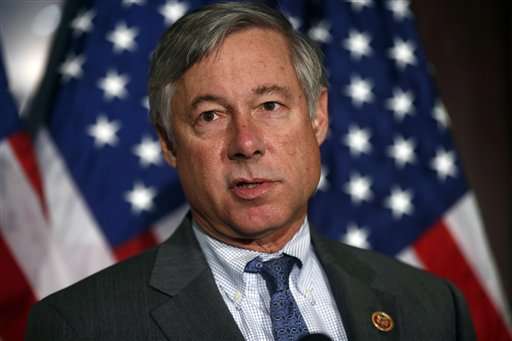Big House vote to speed drug approvals, boost research (Update)

For the second time this year, the House used overwhelming bipartisan unity Friday to approve health legislation, this time voting to bolster biomedical research and streamline how the government approves drugs and medical devices.
The chamber's 344-77 vote sent the measure to the Senate, where a bill is unlikely until later this year. It is unclear how different the Senate version will be.
"Hopefully it will in fact trigger a similar reaction in the Senate, where families know that there really is hope," Rep. Fred Upton, R-Mich., chief author of the bill with Rep. Diana DeGette, D-Colo., said of the lopsided House vote. Upton chairs the House Energy and Commerce Committee.
Supporters said that with medicine rapidly creating new treatments, it was time to modernize how the federal Food and Drug Administration assesses the safety of new products and allows their use by patients. The bill was backed by the pharmaceutical, biotechnology and medical device industries and research universities.
But consumer groups and some doctors said some provisions sacrificed sound science for speed and could be dangerous.
"There are parts of this bill that unnecessarily allow drugs and devices to be approved based on very limited data and unnecessarily accelerate products to market before we know enough about their safety and effectiveness," Dr. Aaron Kesselheim, a Harvard University medical school professor, said in an interview.
Kesselheim, who recently wrote an article criticizing the bill in The New England Journal of Medicine with Harvard colleague Dr. Jerry Avorn, said the legislation contained a "false assumption" that current FDA approval processes are too slow.
The two parties remain deeply divided over President Barack Obama's health care overhaul, which Democrats defend and Republicans want to repeal and which looms as a top-tier issue for next year's presidential and congressional campaigns.
But on other health issues, they've found common ground. This spring, they banded together to easily approve legislation revamping how Medicare pays doctors, an issued that had nagged them for years.
Republicans backed Friday's bill by 170-70, while Democrats supported it 174-7.
Over the next five years, the House measure would provide an extra $1.75 billion yearly for the National Institutes of Health, which finances much of the country's biomedical research. Its annual budget has been roughly $30 billion.
The bill would give the FDA $110 million more annually over that period. Its budget has been over $4 billion.
The legislation contains numerous ways for FDA regulators to accelerate clinical trials of products, including allowing the use of data from case studies, patients' experiences, other countries and medical journals.
Procedures would be streamlined for approving some new antibiotics and medical devices considered breakthrough technologies. Producers of existing drugs would get an extra six months of protection from competition if their drug is approved for use against rare diseases.
In a letter to lawmakers, the White House embraced the measure's added research funds and efforts to accelerate drug development. It criticized its extension of competition-free periods for some drugs and said some therapies would be available before their safety was proven, but did not threaten a veto.
Conservatives were unhappy because the NIH and FDA would get their additional research funds automatically and because that money would be on top of—not part of—the amounts Congress spends annually on domestic programs. They offered an amendment under which the research money would not be guaranteed, but it was opposed by GOP leaders and the chamber rejected it, 281-141.
Democrats lost an effort to delete language applying government-wide abortion restrictions to the legislation.
The bill's new spending would be paid for, mostly by selling $7 billion worth of oil from the Strategic Petroleum Reserve, the government's emergency oil stockpile. Another $2.5 billion would come from trimming federal Medicaid reimbursements to states.
© 2015 The Associated Press. All rights reserved.
















